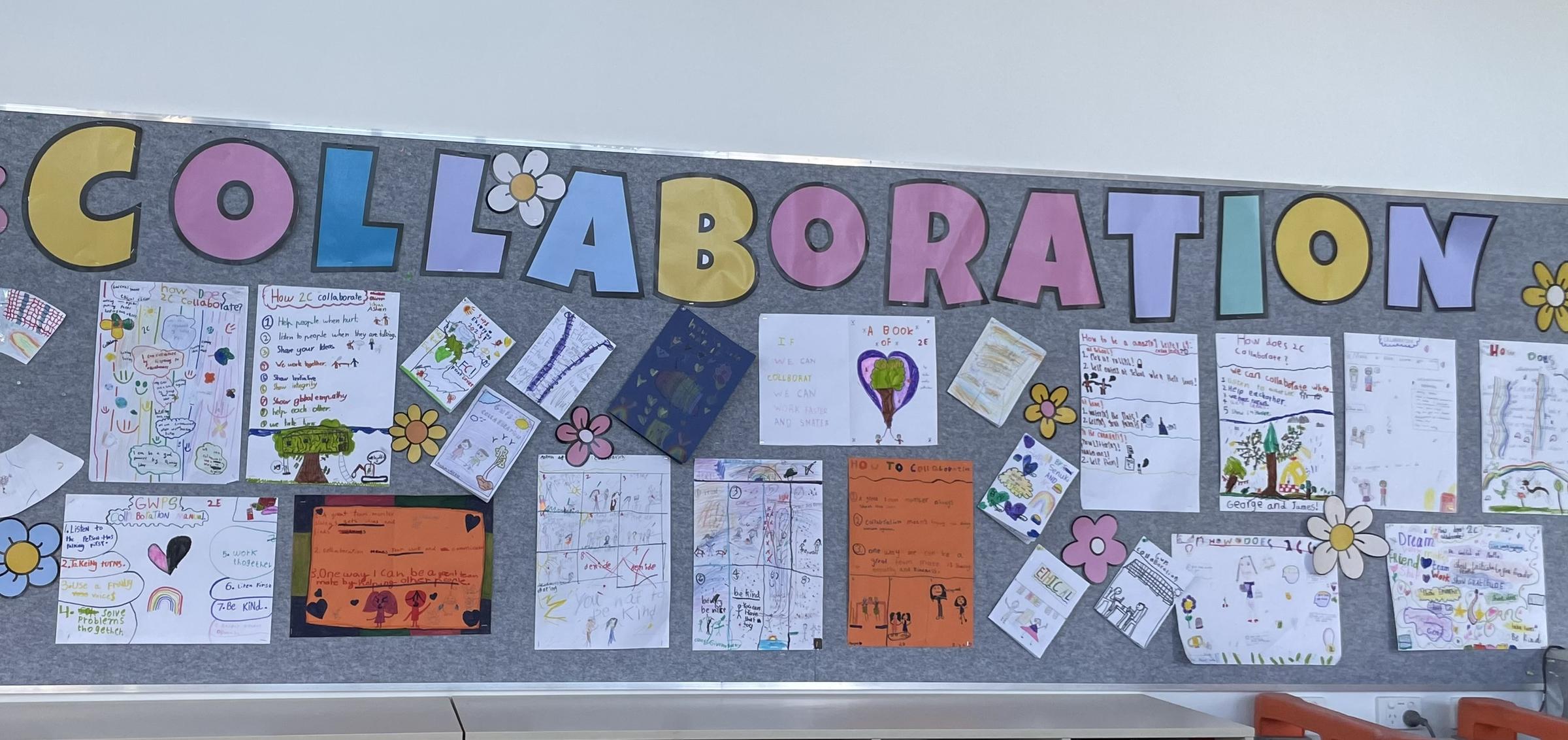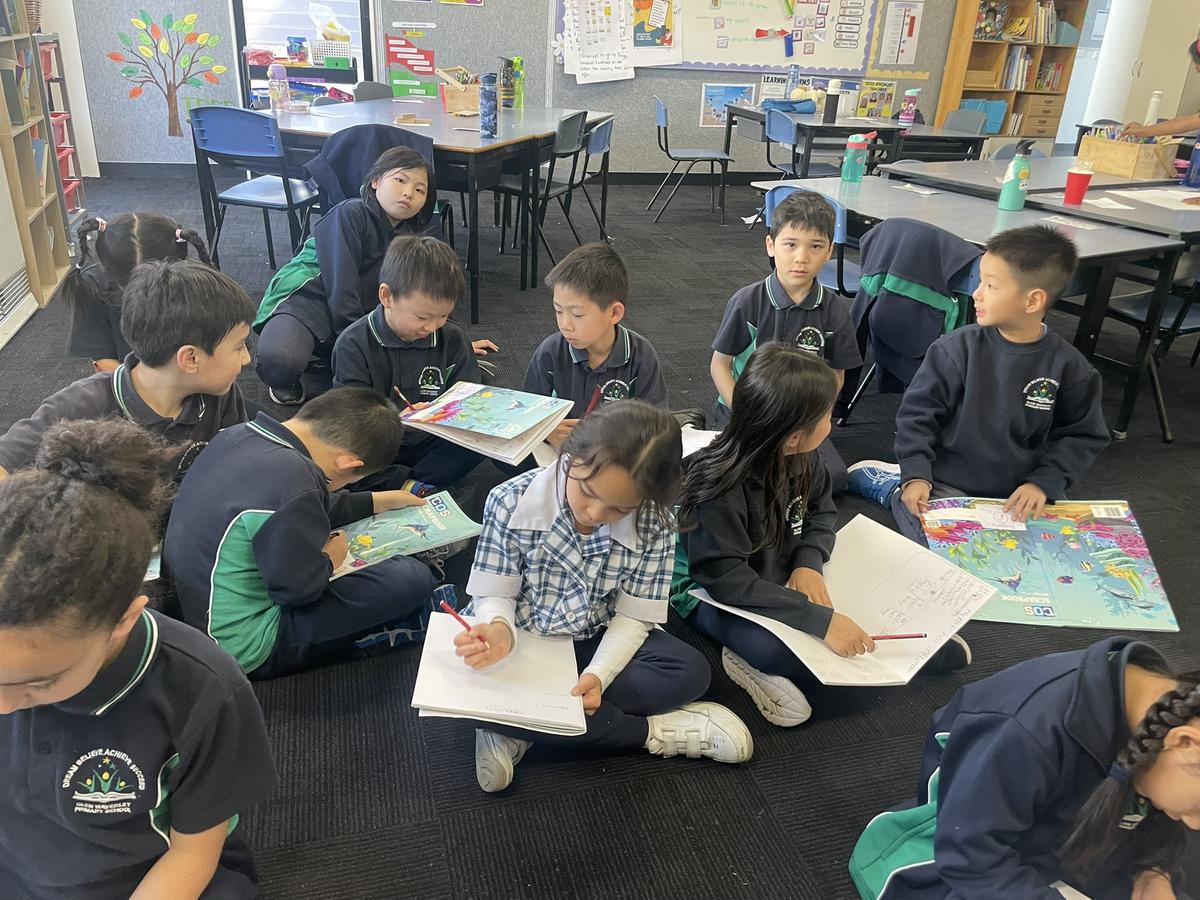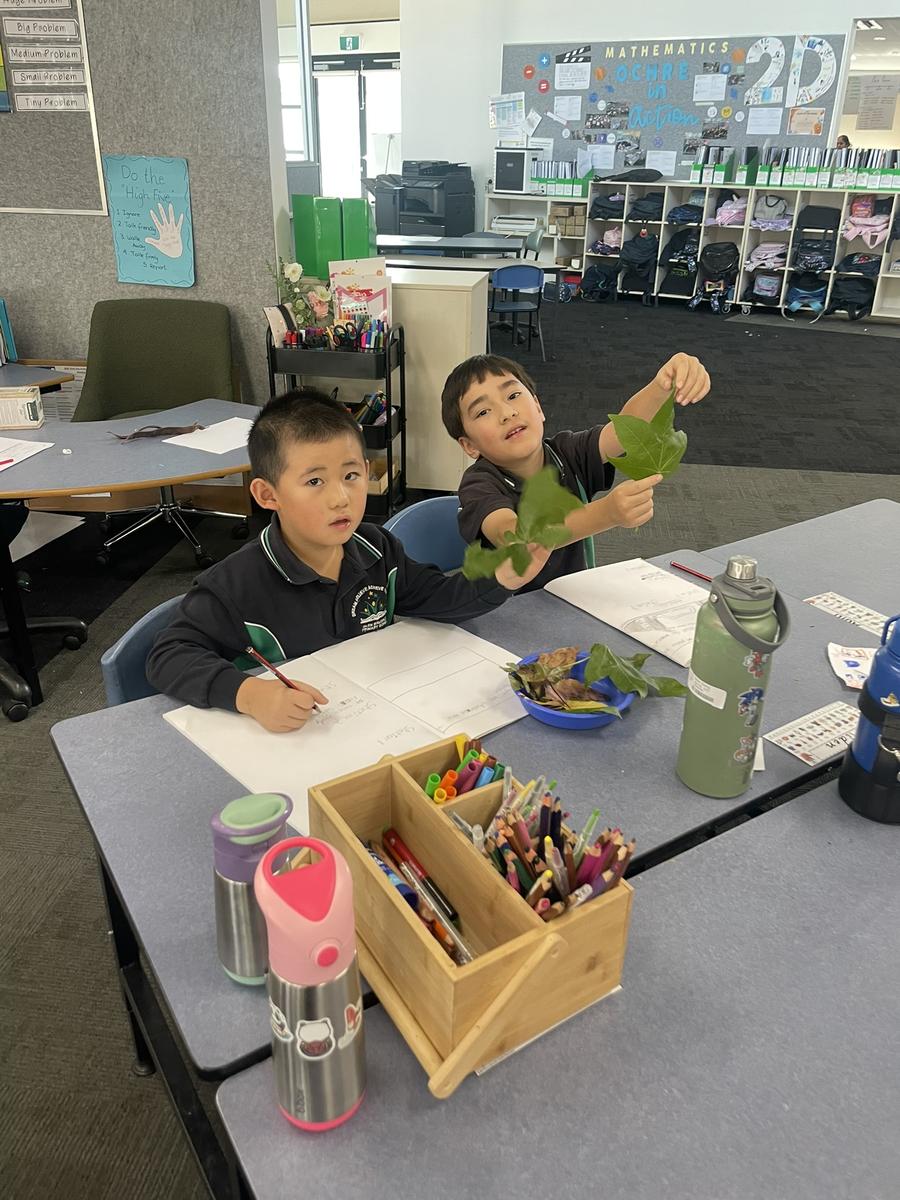Term Two

English
Initial Lit – (Reading and Viewing, Speaking and Listening)
Reading lessons: Students will continue focusing on comprehension and fluency with new vocabulary introduced and discussed each lesson. They will complete a series of related learning experiences connected to the shared text on narrative and informative genres. The students will also be focusing on persuasive texts, asking questions and predicting what will happen in the text.
Spelling lessons: Students will continue to build their phonemic knowledge of sounds this term as well as develop their understanding of suffixes and how they are added to “base words”. They will continue exploring spelling rules for digraphs, trigraphs, long vowels and learn more "Tricky words” that do not follow regular spelling rules. Learners will be encouraged to articulate the sounds and apply them to words within each lesson.
Story Book lessons: Students will participate in repeated reading of a rich, quality texts, such as the Snail and the Whale, by Julia Donaldson and Pete the Sheep by Jackie French. Learners will have opportunities to discuss new vocabulary and sort words into their parts of speech or “helpful word towers” that are displayed in the classrooms which include nouns, verbs, adjectives, and adverbs. Students will continue participating in learning tasks that unpack the characters within the text and the plot to build literal and inferred understandings.
Grammar: Students will learn about types of adjectives, like those describing appearance, texture, sound, taste, smell and emotions. Understanding adjectives is crucial as they help enrich writing by providing vivid details and creating a clearer picture in the reader's mind. Students will also learn how to use adjectives both before and after nouns, as well as how to effectively use multiple adjectives separated by commas to add depth to their descriptions. Additionally, they will practice identifying and constructing noun groups, which enhances their ability to structure sentences and communicate ideas more precisely.
To support your child’s learning at home, you can:
- Ensure your child reads every day for 10-15 minutes from their school readers and aloud to an adult or older sibling at least once a week.
- Ask your child what their “Tricky Words” are for the week and test them on spelling these orally.
- Point out and discuss examples of verbs, adverbs, nouns, pronouns and adjectives in books, signs, and other reading materials.
Writing
In Term Two, Year Two students will be immersed in the writing genres, Persuasive and Procedural. While exploring persuasive writing, students will learn the difference between fact and opinion and how to give reasons to support their opinion. They will also explore the use of persuasive devices, such as emotive words and phrases, multimedia and repetition. As the final transfer, students will create a persuasive piece to convince readers on why we should protect the environment, linking to their Inquiry unit. While exploring Procedural texts, students will enhance their understanding of using accurate descriptions to communicate instructions, the purpose of procedures and link it to real-life concepts, such as science experiments, instructions and recipes.
To support your child’s learning at home, you can:
- Involve your child in cooking from recipes at home, drawing attention to the single words or phrases that are the instructions.
- Play ‘Would you rather?’, by provided a situation such water is better than soft drink, then ask your child to give reasons for their choice
- Practicing handwriting and letter formation. Encourage your child to write for enjoyment (writing letters, stories) and help them to focus on their handwriting when completing Home Learning tasks.
Speaking and Listening
This term, learners will engage in conversation and debate to persuade others that their opinion is correct. This will be linked with our Literacy topic of persuasion. Learners will provide explanation and reason for their opinion and will explore the use of persuasive devices in conversation.
In Mathematics, learners will be encouraged to similarly reason their answer to explain how they arrived at that conclusion and how they know they are correct. This will ensure learners are using appropriate mathematical language to explain the concepts.
Finally, learners will continue to engage in G.E.M chats throughout the term. This will include building emotional and social skills such as gratitude, empathy, mindfulness and emotional literacy. Through the Resilience Project, learners will engage in short G.E.M chats that focus on a different skill each week. They will be encouraged to reflect on appreciating others and voicing their gratitude aloud.
To support your child’s learning at home, you can:
- Discuss the emotions felt when faced with challenging situations. Explore situations on how to overcome those strategies.
- Ask learners to explain their thinking when completing Home Learning activities.
- Engage in conversation about topics and practice debating both points of view.
Key Vocabulary:
Writing:
- Opinion
- Convince
- Information
- Evidence
- VOICES
Grammar:
- Proper nouns
- Common nouns
- Pronouns
- Adjectives
Spelling:
- Digraph
- Long vowel
- Tricky Words
Mathematics
This Term, we will continue to implement mathematics using OCHRE curriculum resources. Ochre provides a structured approach to developing foundational mathematical skills, grounded in the Science of Learning and aligned with the Victorian Curriculum. The program emphasises problem-solving and critical thinking, aiming to build confident, numerate learners who can apply mathematical concepts to understand the world around them.
Learners will consolidate their skills in a variety of concepts using hands on materials and investigation. Already, students have explored and deepened their understanding of data collection. Learners have honed their number line, skip counting and number pattern skills through concrete materials, multiple representations and game-based learning experiences.
Throughout the rest of this term, learners will be exploring place value using partitioning (the process of breaking numbers down to look at the values of each digit). Then they will be transferring their knowledge of place value into Addition and Subtraction using various strategies and making links between each operation.
To support your child’s learning at home, you could:
- Play Maths challenges with a family member, for example, generate an addition or subtraction equation. Race to solve the equation.
- Practice using the addition and subtraction strategies. Encourage your child to explain their chosen strategy.
- Skip Count Walk – When walking, ask your child to skip count by 2s, 5s, 3s, 10s saying the next number each step they take. For an extra challenge, ask your child to start from an odd number.
Key Vocabulary:
- Skip count
- Number pattern
- Number line
- Hundreds chart
- Pattern
- Digit
- Concrete materials
Inquiry
Question: How might we influence the environment?
Global Goal:
12.2 Sustainable Management and Use of Natural Resources
12.3 Halve Global Per Capita Food Waste
Summary of Learning:
In Term Two, learners will explore the concepts behind the inquiry question, “How might we influence our environment?” These concepts include understanding how to be sustainable through the Global Goals of ocean and water through various hands-on activities. Learners will be encouraged to reduce plastic use by bringing nude food to school. In Week 5, learners will also go on an excursion to CERES to explore a local wetland and understand water cycles and the impact humans have on them. They will experiment at school with water testing strips to see how clean our water is. As a final transfer, learners will bring in their empty cans and bottles to recycle and raise money to donate it to a charity of their choice.
Key Vocabulary:
Environment, Influence, Sustainability, Waterway, Packaging, Origin, Process/cycle
Materials: plastic, metal, synthetic, natural, hybrid cardboard,
Recycle, Ocean, Wetlands, Mangroves, Lakes, Rivers, Creeks, Catchment, Process/cycle, Impact
How can you support your child’s Inquiry learning at home?
- To support your child’s learning at home, you can:
- Discuss with your child what sustainable practices on resources look like at home.
- Analyse where materials in your house come from.
- Adopt sustainable practices of water saving and bring nude food to school.
Wellbeing
The Resilience Project
In Grade 2 Term 2, we explored The Resilience Project and learning about the importance of Emotional Literacy. Emotional Literacy is the ability to recognize, understand, and express our feelings, and it’s a vital part of building strong, positive relationships and developing resilience.
This term, the students have been engaging in activities to identify their emotions and practice strategies for managing them. Through the group discussions, collaborative and creative tasks, they’ve been learning how to express their feelings in words, listen to others with empathy, and build a toolbox of strategies to calm their minds during challenging times.
One of our favourite activities has been “GEM Chat,” where students focused on fostering positive connections and building emotional awareness. Students shared moments of gratitude, practiced understanding others’ feelings, and engaged in mindful reflection, creating a safe and inclusive environment.
It’s wonderful to see the Grade 2 students becoming more aware of their emotions and developing the confidence to express themselves!
Key Vocabulary:
- Empathy
- Gratitude
- Mindfulness
How can you support your child’s Wellbeing learning at home?
- Showing Gratitude and being grateful for what we have.
- Practicing Mindfulness at home like mindful breathing and colouring.
- Showing Empathy such as being an active listener.
Cyber Safety
In Term 2, the year 2’s will continue their journey navigating through the Cyber Safety Project, with emphasis on safety and integrity. This project will help our students develop essential digital literacy skills, while also encouraging them to think critically about their actions and well-being in the online world. This will include lessons on digital citizenship, respecting others online, and maintaining privacy and security when using technology in the classroom. By the end of Term 2, students will have developed essential skills for navigating both their emotional wellbeing and the digital world safely, helping them to thrive both academically and personal setting.


